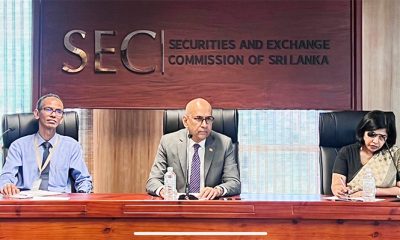Business
SEC approves a regulatory framework for Sri Lanka Infrastructure Bonds

The Securities and Exchange Commission (SEC) has approved a regulatory framework to facilitate the issuance and listing of Infrastructure Bonds on the Colombo Stock Exchange (CSE). This landmark decision by the SEC is aimed at fostering both foreign and local investments in infrastructure projects that will contribute to the economic development and well-being of the country.
Infrastructure Bonds aim to raise capital for vital projects such as roads, rail, water management, waste management systems, airports, seaports, mixed development projects, natural disaster protection systems, deep water ports, gas supply systems, utility projects, telecommunications infrastructure, etc. which are integral to economic growth and sustainability.
It is necessary for Sri Lanka to develop a market for Infrastructure Bonds and raise the long – term capital needed for infrastructure projects. The scope of infrastructure development in emerging economies has evolved significantly in recent decades and now comprises a broad range that includes traditional infrastructure projects such as power, oil and gas, and water as well as low-carbon, climate-resilient infrastructure such as renewable energy projects.
SEC carried out a study of comparable jurisdictions which had successfully used Infrastructure Bonds listed in the capital market to finance major development projects of their respective governments.
Aimed at fostering development, transparency, and investor confidence in the capital market, the SEC has set a Capital Market Reforms Agenda which includes 12 Key Areas for action. The introduction of infrastructure financing products are part of the Reforms Agenda and is strategically designed to propel the capital market to new heights and contribute significantly to its growth and sustainability. The CSE is expected to market this product actively among potential issuers.
The regulatory framework for Infrastructure Bonds has provisions to ensure investor protection, stringent due diligence, disclosure, and reporting requirements for issuers in order to keep investors informed on the performance of the infrastructure projects, utilization of proceeds and risk factors pertaining to the infrastructure projects as well as enforcement procedure for non – compliance with the regulatory framework. Disclosure requirements include details of the project in which the capital raised is deployed or allocated, progress updates on how the project fulfills its core purpose and objectives and benefit to the public at large, and any deviations in the use or allocation of the capital proceeds. This initiative reflects SEC’s commitment to create an enabling environment for long – term investments in infrastructure projects that support the nation’s economic growth and development.
Chairman SEC, Faizal Salieh, stated, “The misallocation of capital is a root cause of our economic crisis. It is our objective to enable instruments that can raise long – term capital for development projects and provide investor assurance that such capital is allocated to the project’s stated purpose with transparency and accountability. We have now created an opportunity for Government bodies such as Municipal Councils, Urban Councils, Local Government Councils, the Urban Development Authority, etc. and even large private sector companies to finance infrastructure projects through these bonds.”
Business
Binance signals a maturing Crypto pitch in Sri Lanka

Frames crypto investing as a ‘measured journey rooted in knowledge and security’
In an industry often characterised by velocity, volatility and viral marketing, Binance’s latest community activation in Sri Lanka suggested a deliberate recalibration of its investor messaging.At its #BinanceHODLove event held at One Galle Face Mall, the world’s largest crypto exchange by trading volume chose a Valentine’s-themed slogan that stood out for its restraint: “Real Love Doesn’t Rush, Neither Should Crypto: A Valentine’s Message for Smart Investors.”
Behind the seasonal branding lies a more strategic theme – one that aligns with the crypto industry’s post-cycle shift toward compliance, literacy and risk awareness.
Sri Lanka’s retail investor base has demonstrated periodic interest in digital assets, particularly during phases of currency pressure and global crypto rallies. Yet market participation has also exposed gaps in financial literacy and susceptibility to high-yield promises.
Binance’s messaging at the event leaned heavily into investor caution. Participants were reminded to scrutinise unsolicited offers, avoid guarantees of quick returns, and protect sensitive information such as private keys and passwords. In a market where informal crypto schemes have occasionally surfaced, such emphasis reflects reputational risk management as much as community engagement.
The company also spotlighted Binance Academy, its educational platform, positioning knowledge acquisition as foundational to long-term participation in blockchain ecosystems.
While the event featured raffles and consumer electronics giveaways to drive footfall, the broader objective appeared to be brand consolidation at the grassroots level. Physical activations in high-traffic urban centres suggested a hybrid strategy: digital scale complemented by localised trust-building.
For a global exchange operating in increasingly scrutinised regulatory environments, nurturing responsible retail participation is both a defensive and expansionary move. By framing crypto investing as a “measured journey rooted in knowledge and security,” Binance is aligning itself with the industry’s pivot toward sustainability rather than speculative exuberance.
The subtext of the campaign was clear: growth in emerging markets like Sri Lanka will depend less on price momentum and more on credibility.
Binance’s Valentine’s message, therefore, may be less about romance and more about risk calibration. In that sense, the slogan captured a broader industry truth: endurance, not impulse, will define the next phase of digital asset adoption.
By Sanath Nanayakkare
Business
Unlisted tax jitters frizzle CSE rally; analysts flag spillover fears

Morning gains on the Colombo Stock Exchange (CSE) evaporated sharply in afternoon trade yesterday, as a wave of nervous selling swept through the market triggered by speculation that the government is mooting a fresh 10-15 percent tax on unlisted corporates. Although the proposed levy is currently targeted at entities outside the CSE purview, market participants grew wary that the measure could signal a broader shift in fiscal policy, stoking fears of future tax hikes that may eventually engulf listed companies and dent corporate earnings.
Amid those developments, the turnover was capped at a mere Rs 369 million despite fourteen crossings.
The top seven crossings mainly contributed to the turnover were Commercial Bank 1.60 million shares crossed to the tune of Rs 359.7 million and its share price traded at Rs 223, Renuka Foods 2.7 million shares crossed to the tune of Rs 179.6 million and its share price traded at Rs 63.50, LOLC Holdings 300,000 shares crossed to the tune of Rs 171.9 million and its share price traded at Rs 573, Sampath Bank 821,000 shares crossed to the tune of Rs 132 million and its share price traded at Rs 161, Commercial Bank (Non-Voting) 484,000 shares crossed to the tune of Rs 98.9 million and its share price traded at Rs 204, Sierra Cables two million shares crossed to the tune of Rs 69.6 million and its share price traded at Rs 34.80 and Citizens Developments Business Bank (Non-Voting) 200,000 shares crossed to the tune of Rs 62.9 million and its share price traded at Rs 324.
In the retail market top seven companies that have mainly contributed to the turnover were Renuka Agri Rs 1.14 billion (82.4 million shares traded), Softlogic Finance Rs 653.9 million (115 million shares traded), Sampath Bank Rs 270.8 million (1.65 million shares traded), Softlogic Capital Rs 230 million (19.3 million shares traded), JKH Rs 201 million (nine million shares traded) ,LOLC Holdings Rs 171.9 million (297,000 shares traded) and LMF Rs 171 million (1.8 million shares traded). During the day 369 million shares volumes changed hands in 39059 transactions.
It is said that banking and agriculture related companies performed well. In the banking sector Sampath Bank and Commercial Bank performed well. Further manufacturing sector especially JKH also significantly active in the market.
By Hiran H Senewiratne
Business
ComBank loan book grows by Rs. 541bn to top Rs. 2tn

The Commercial Bank of Ceylon achieved another performance milestone in 2025, becoming the first private sector bank in the country to expand its loan book beyond Rs. 2 Tn., with a growth of Rs. 541 Bn. over 12 months at a monthly average of over Rs. 45 Bn., demonstrating its commitment to national economic resurgence.
Recording the highest annual loan growth in absolute terms in the history of the institution, the Bank said gross loans and advances for the year ending 31st December 2025 grew by 36.37% to Rs. 2.028 Tn., taking total assets to Rs. 3.258 Tn. This reflected an increase of Rs. 468 Bn. or 16.78% and demonstrated more than double the growth recorded in 2024. The Bank’s net assets value per share improved to Rs. 198.30 from Rs. 170.94 at end 2024.
Deposits grew by 16.65% or Rs. 372 Bn. over the 12 months to end the year at Rs. 2.6 Tn., reflecting an average deposit growth of over Rs. 30 Bn. per month despite relatively lower interest rates, the Bank said. The CASA ratio of the Bank, which is considered to be the industry’s best, stood at 39.65% from 38.07% as at 31st December 2024.
Sharhan Muhseen, Chairman of Commercial Bank said: “We remain focused on the fundamentals that sustain shareholder value: earnings resilience, balance sheet strength, disciplined risk management and a strategy that is responsive to evolving customer and market needs. Our 2025 performance affirms the value of that focus.”
Sanath Manatunge, Managing Director/CEO of Commercial Bank said: “In 2025, we proved that scale and discipline can move together, growing lending and accelerating digital activity while strengthening asset quality and balance sheet resilience.”
In a filing with the Colombo Stock Exchange (CSE) the Bank said it recorded gross income of Rs. 354.81 Bn. for the year ending 31st December 2025 reflecting growth of 13.70% over the normalised figure for 2024, after adjusting for the impacts of restructuring of Sri Lanka International Sovereign Bonds (SLISBs) accommodated in that year, in order to avoid potential distortion of growth figures. Net gains / (losses) from derecognition of financial assets in the Income Statement for 2024 (as reported) included a derecognition loss on restructuring of SLISBs amounting to Rs. 45.108 Bn.
-

 Features7 days ago
Features7 days agoWhy does the state threaten Its people with yet another anti-terror law?
-

 Features7 days ago
Features7 days agoReconciliation, Mood of the Nation and the NPP Government
-

 Features7 days ago
Features7 days agoVictor Melder turns 90: Railwayman and bibliophile extraordinary
-

 Features6 days ago
Features6 days agoLOVEABLE BUT LETHAL: When four-legged stars remind us of a silent killer
-

 Features7 days ago
Features7 days agoVictor, the Friend of the Foreign Press
-

 Business6 days ago
Business6 days agoBathiya & Santhush make a strategic bet on Colombo
-

 Business6 days ago
Business6 days agoSeeing is believing – the silent scale behind SriLankan’s ground operation
-

 Features7 days ago
Features7 days agoBarking up the wrong tree























